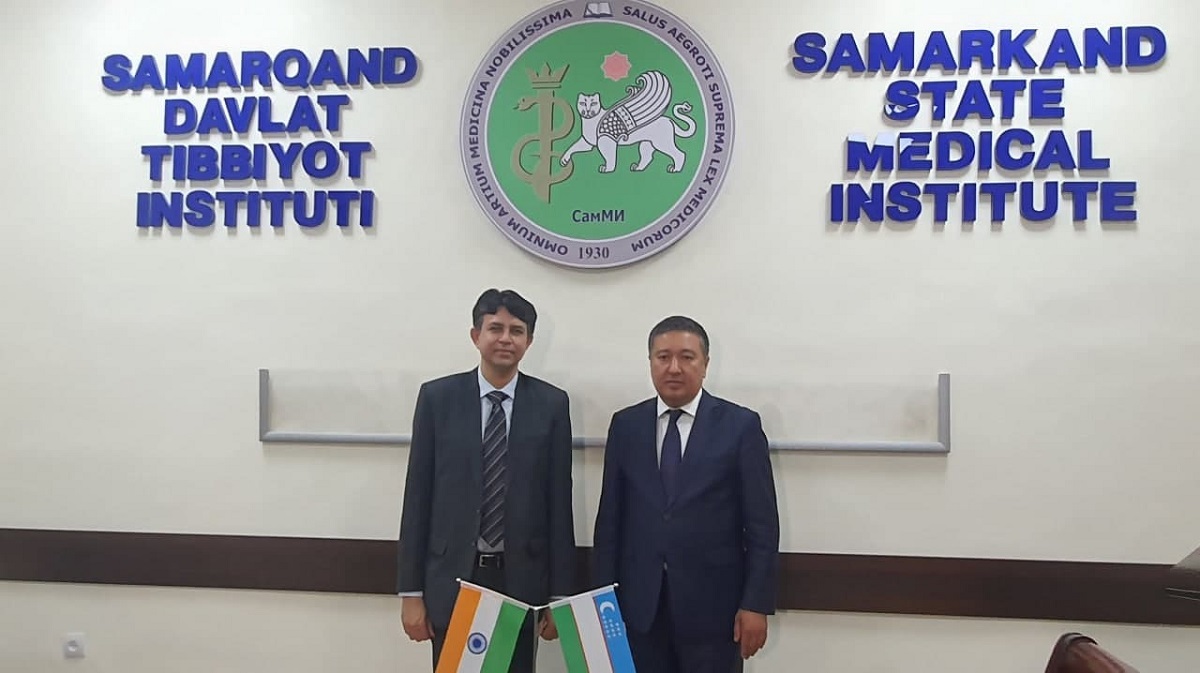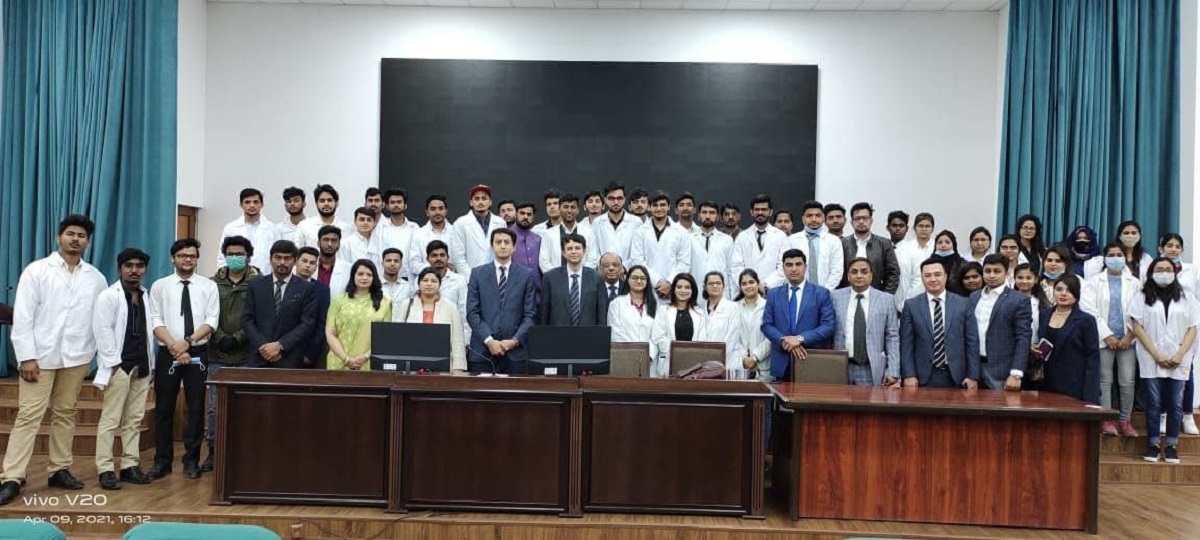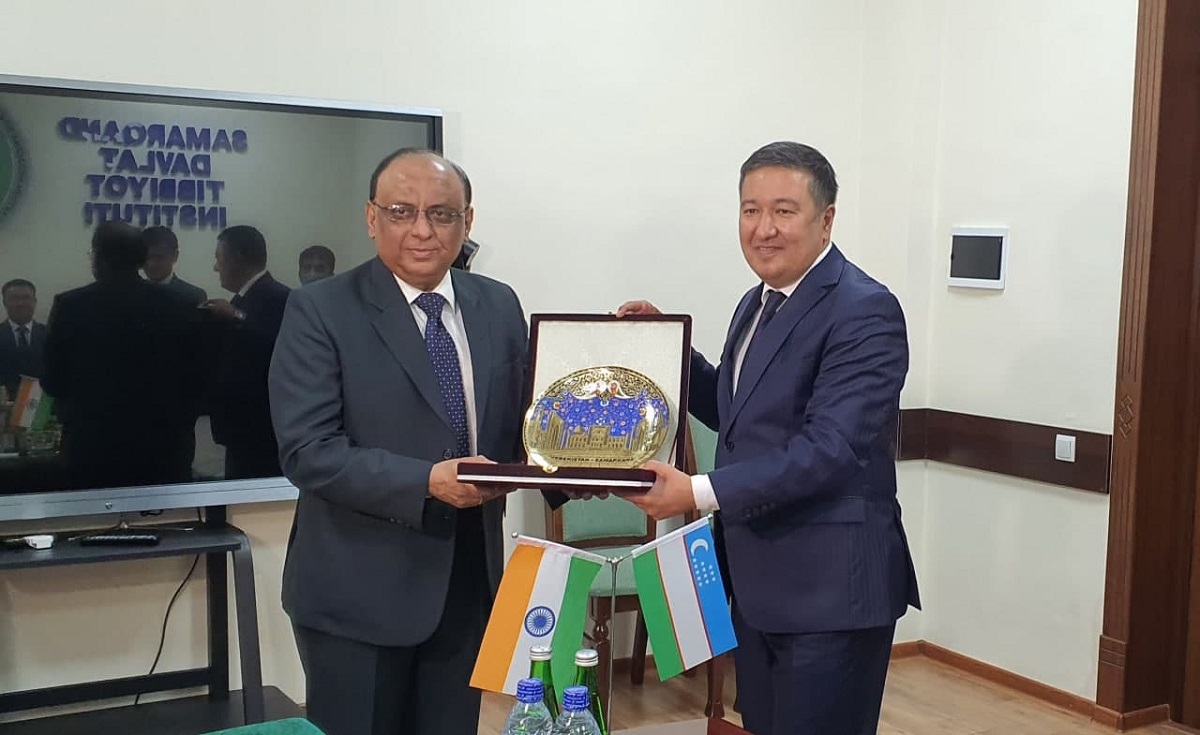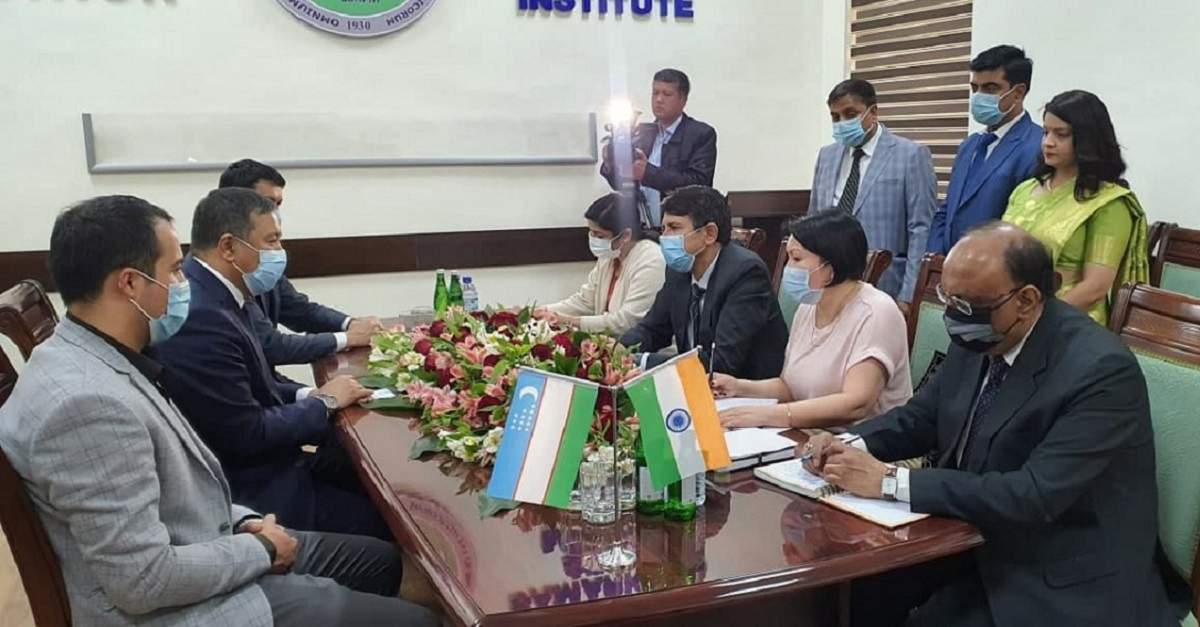About the university
Samarkand State Medical University was founded according to the decision of the republic government 90 years ago, in 1930. The University has passed a long path of development as one of the leading medical higher educational institutions not only in Uzbekistan, but also in the whole Central Asian region.
State Uzbek Medical Institute was founded in Samarkand by the Resolution of the Council of People's Commissars of Uzbekistan No.80 in May 7, 1930. This was a great event for the population of the Central Asian region, as there was no independent medical higher education institution in that region.

Indian Ambassador and Students At Samarkand State Medical Institute
Samarkand State Medical Institute (since April 2022 - University) received a special development after the republic achieved independence. In 1997, the country adopted a “National Programme of Training”, and in 1998 a State Programme of Health Care Reform, which resulted in the establishment of a Faculty of Higher Nursing in 1999. A Faculty of Medical Pedagogy was opened in 2001, and in 2005 the Faculty of Stomatology, Medical Preventive Medicine, Medical Biology, Pharmacy was opened, and in the following years the students were enrolled in a new course called "Traditional Medicine".
In 2020, the coronavirus pandemic COVID-19 will radically affect all areas of life in almost every country in the world. There is even speculation that the changes are so profound that we will have to adapt to them by applying constant hygiene.
This pandemic also had a profound effect on the field of education. From the first days of the pandemic, our University, like all educational institutions in the country, switched to distance learning. Since 2013, our own e-learning platform (moodle.sammi.uz) was created and successfully operated, and the entire learning process from April to the end of the academic year was carried out on it.
Due to the specific nature of our HEI and the fact that the backbone of its human resources is made up of health workers, it is natural that from the very beginning of the introduction of quarantine they were able to fully and promptly reorganise all work to meet the requirements of distance learning. Since the beginning of the academic year 2020-2021, an entirely new electronic platform of the university (mt.sammu.uz) has been in operation for conducting classes online; all basic teaching materials have been converted into electronic format and placed in a specially created virtual resource base to which all teachers and students have access.
The University established cooperation with renowned foreign universities such as the Volga Medical Research University, Chuvash National University named after I.N. Ulyanov (Russia), Ternopol National Medical University named after Y.B. Gorbachevsky (Ukraine), National Louis University Graduate School of Business (Poland), Belarusian State Medical University (Republic of Belarus) to train staff in joint educational programmes aimed at academic degrees of Bachelor and Master in a number of fields. The training of personnel under the programme of second higher education together with the Korean side is actively carried out. Also, from academic year 2020-2021 students from the IRP and India, who intend to receive higher medical education in the walls of the university, will be admitted.
On December 24, 2021, President of Uzbekistan signed two important documents on fundamental changes in higher education system “On additional measures to ensure academic and organizational and managerial independence of public higher education institutions” and “On measures to ensure financial independence of public higher education institutions”.
The documents adopted opened a new page in the development of the country's institutions of higher education. According to these documents, the higher educational institutions will have a new wide range of rights and opportunities, including the following: creation and publication of textbooks and other educational and scientific literature based on their own plan for the higher educational institution and its branches; creation and implementation of internal control mechanisms of education quality; implementation of main activities related to education, science, implementation and commercialization of its results, creation of non-state structures, commercial and non-commercial organizations; approval of the new system of higher education, which will ensure financial independence of higher educational institutions. The Rector emphasized that these documents grant not only rights and autonomy, but also impose a special responsibility for their implementation on the university staff.
According to these documents, a list of public higher education institutions was approved, which includes Samarkand State Medical University, which from 1 January 2022 grants financial autonomy. Universities are empowered to make independent decisions on the issues of determining the cost of education on a fee-contractual basis, establishing and extending the terms of payment of fee contracts by students, attracting domestic and foreign professors, teachers and specialists on a contractual basis, who are able to use modern educational technologies in the educational process and conduct research, establishing the amount of payment for foreign highly qualified specialists involved in the scientific and educational process, as well as the amount of remuneration of the students.
Starting from the academic year 2022-2023, the listed universities have the authority in the academic sphere - to approve study programmes and curricula as well as qualification requirements; to determine the language and form of study; to determine the duration of Bachelor and Master studies, to approve the procedure for supervising doctoral and postgraduate students; to introduce part-time, evening and distance learning in Master programmes; to develop and publish textbooks and other academic and scientific literature for universities; to determine and implement internal controls They can also make their own decisions on the transfer of foreign citizens to study from foreign HEIs and approve their examination procedures and criteria for assessing the students' knowledge.
Starting from the academic year 2022-2023, universities are be able to: establish structural units that engage in activities in education, science, and the implementation and commercialisation of research results. Universities will also be able to independently determine the rules of internal regulations, in particular, to determine the dress code. A supervisory board will be established, which will include representatives of the university's heads of departments and ministries, as well as the general public. The supervisory boards will be given wide-ranging rights and powers in the activities of the HEI. According to the Resolutions, students, researchers and teachers will have free access to international databases. Literature in HEIs' libraries will be digitised and published on the Ministry of Higher Education's “Electronic Library” platform. All reporting at higher education institutions will be transferred to an online format and for this purpose the Ministry of Higher and Secondary Specialised Education, together with the World Bank, will gradually introduce the Higher Education Process Management Information System. It should be noted that the exemption from customs duties on imports of training, scientific laboratory and special equipment, educational and scientific-methodological literature, teaching multimedia products and equipment by 2024 will help to further strengthen the material and technical base and capacity of higher education institutions.
The decision of President of Uzbekistan Shavkat Mirziyoyev dated April 1, 2022 “On establishing Samarkand State Medical University and further perfection of training system in this sphere” on establishing a modern medical university in ancient Samarkand based on Samarkand State Medical Institute, embodying the most advanced achievements of local and international experience, has strategic significance in our view. Our institution has everything required for this, including a robust scientific and pedagogical potential, a rich material and technical base, and a longstanding tradition of training qualified medical personnel. According to the presidential decree, the orientation of the educational process towards the formation of practical skills, the widespread introduction of advanced pedagogical technologies, curricula and innovative materials based on international educational standards, the creation of the necessary conditions to ensure the combination of theoretical knowledge and practice in the clinic and the educational base, the development of academic mobility programs for students, teachers and researchers in the framework of cooperation with foreign medical universities, conducting fundamental, applied and innovative research to solve existing problems in medical practice, the gradual introduction of the concept of “University 3.0”, which provides an integral connection of medical education, science, practical healthcare with real sectors of the economy become possible now.
The Decision also pays special attention to the development of the University's therapeutic base and its practical orientation, in particular, the establishment of the Scientific Research Institute for Rehabilitation and Sports Medicine at the Samarkand regional hospital; the creation of a multidisciplinary University clinic and a Specialized centre for paediatric surgery at the first and second clinics of the Samarkand State Medical Institute; and the establishment of the Scientific Research Institute for Microbiology, Virology, Infectious and Parasitic Diseases.
At present, the university provides education at 9 faculties in 9 Bachelor's degrees:
Faculties:
- "Faculty of medicine";
- "Faculty of pediatrics";
- "Faculty of medical pedagogy";
- "Faculty of higher nursing";
- "Faculty of dentistry";
- "Faculty of pharmacy";
- "Faculty of medical Prevention, Public Health and Medical Biology";
- "International Faculty";
Academic programs:
- "General Medicine";
- "Paediatrics";
- "Vocational education (medical practice)";
- "Graduate nursing";
- "Dentistry";
- "Medical Preventive Medicine";
- "Pharmacy";
- "Biomedical science";
- "Traditional Medicine";
- "Clinical Psychology";
- "Management: Health Care Management"
These faculties carry out their activities on the basis of 74 departments, 1190 classrooms equipped with modern computers and 75 multimedia classrooms. Samarkand State Medical University has an academic lycée.
Eligibility Criteria to Study MBBS in Tashkent State Dental Institute, Faculty of Medicine
- Tashkent State Medical And Dental Institute offers a recognized program.
- Students must complete their SSC and HSC i.e. 10+2 from a recognized state board.
- HSC should be completed in Science subjects including – biology, physics, and chemistry.
- The applicant should complete their age of 17 years on or before 31st December of the year of admission.
- The candidate must have a score of at least 50% in their HSC boards from a recognized board of examination.
- Applicant must clear NEET examination.
Documents Required:
- 10th Marksheet
- 12th Marksheet
- Neet Scorecard
- Passport
- Passport Size Photo
Admission Process
- Submit the Application form along with the required documents.
- Pay Fees and get a confirmation letter.
- Submit Passport, get Visa/Invitation Letter.
- Get Visa and fly.
- Join your classes.
Contact
India : +91 9860479768
Tashkent : +998 91010 2912



